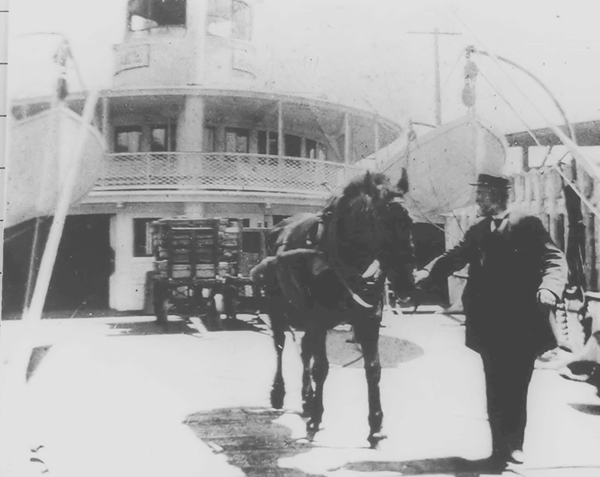From Disaster to Literature
 Tuesday, September 15, 2015 at 03:02PM
Tuesday, September 15, 2015 at 03:02PM By Larry Clinton
The opening of Jack London’s novel, The Sea-Wolf, is based on an historic tragedy – the collision of the sidewheeler ferries Sausalito and San Rafael on foggy San Francisco Bay. Here is a lightly excerpted account of the collision from the book Redwood Railways by Gilbert H. Kneiss:

Dick the horse in happier times on the foredeck of the ferry San Rafael.
Photo courtesy of Sausalito Historical Society
November of 1901 had but a few more hours to live when the blackest, densest tule fog of years rolled in on the Bay and blotted out familiar landmarks as it cued bells, foghorns and whistles to take up their duties. A few chilly, belated commuters raced under the invisible Ferry Tower and aboard the San Rafael for her 6:15 run to home and dinner.
Above, in the San Rafael's pilot house, old Captain McKenzie rang for half-speed astern and backed out through the thick tule fog. Nothing could be seen. The San Rafael started on her course ten minutes late, her wheels poking at fourteen turns instead of the usual twenty-two..
The fog seemed thicker, if such could be, and there was a very heavy ebb tide. Soon he recognized the Sausalito's whistle off his starboard bow. Ordinarily, each would keep to the right of Alcatraz Island, so they would never meet, but a dredger working around Arch Rock had blocked one channel.
Captain McKenzie yanked his whistle cord twice to pass to port; put his helm hard a-starboard. Two blasts out of the fog from the Sausalito agreed with him. But they sounded uncomfortably close and almost dead ahead. Instantly he rang to stop the engine, sounded three short whistles and rang again full speed astern. The big paddles started splashing again, slowly, in reverse.
Suddenly there was a god-awful crash, the ferry's hull splintered open, and the Sausalito's steel prow smashed into the grill and batted one passenger twenty feet through the door. All hell broke loose, so did most of the passengers' self-control. They smashed windows, panicked up the companion ways and fought madly for life preservers. Behind all the racket — the screams, wails and curses, shattering glass and ghostly chorus of foghorns outside — they heard the ominous background of endless waters pouring through the breach.
The officers, at least, kept cool and soon restored some semblance of order. McKenzie and the Sausalito's Captain Tribble had immediately ordered their ferries lashed together and boats launched. A few of the deckhands and some male passengers of both boats began to pass women and children from the San Rafael which was sinking fast. Soon her starboard rail was under water, then her lights blinked out. Splashing through the greedy waves, men dragged the few remaining women to the upper deck where Bartender Gus now handed matrons across to the Sausalito as quick and calm as ever he'd passed a Pisco Punch across the bar.
Captain McKenzie saw that time had about run out. His passengers were almost off — women and children aboard the other ferry and the men bobbing around in life jackets. But Dick, the baggage truck horse, was still tethered in the cabin. McKenzie cut his rope and drove him out, then jumped for the Sausalito. He was just in time. With an almost human sob, the San Rafael vanished. Twenty minutes before, she had been a proud but aging steamer.
The Sausalito's deck resembled a hospital ward. The fog still resembled a cold puree. No one knew where the tides had led them. But the prolonged whistles and failure of the boats to dock had sent two Red Stack tugs to the rescue. One, the Sea King, nosed through the soup just as the last life boat brought more sopping, shivering, cork-jacketed survivors. Tribble grabbed his megaphone and yelled "where are we?" and from the tug they heard the answer: "Off the Presidio light and heading out to sea!"
Flanked by the two tugs, the Sausalito inched along to the haven of her slip and the hysterical cheer that greeted her as she loomed between the pilings showed how the word had spread.
The next day passed under a burden of suspense and rumor. No one knew just who had been aboard, and many, first feared missing, proved to have taken the California Northwestern ferry. The known dead finally shrunk to two men and a four-year-old boy. Despite tales that he had landed happily on one of the lush pastured islands in the Bay, the carcass of Dick, the freight horse, was sighted drifting out to sea.

Reader Comments